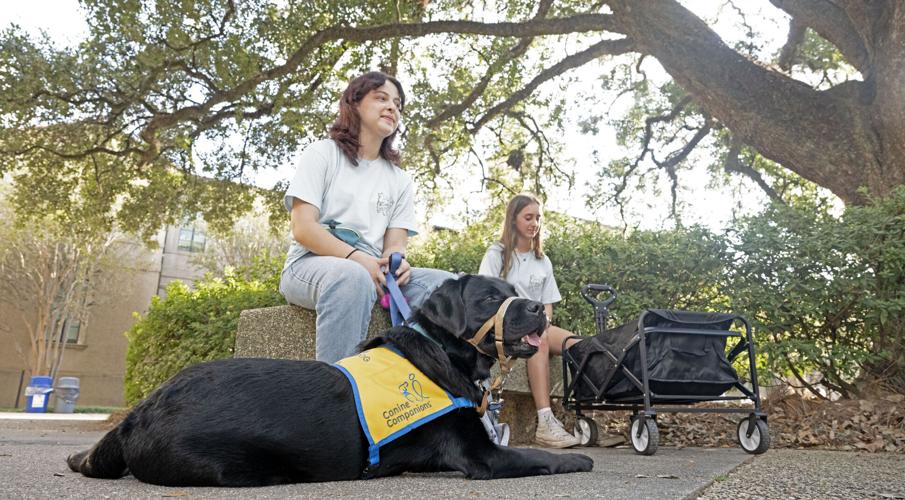Navigating college life can be challenging for students with disabilities, but having a service animal by their side can significantly enhance their experience.

These specially trained animals perform various tasks, from guiding visually impaired students to alerting their owners in medical emergencies.
Understanding the Difference
It’s crucial to recognize that service animals and emotional support animals are not the same. The U.S. Department of Justice defines a service animal as a dog, or occasionally a miniature horse, trained to perform specific tasks for individuals with disabilities.
In contrast, emotional support animals provide comfort but lack the training required to perform specific duties.
College Life with a Service Animal
Service animals allow students to participate fully in campus life. Sarah Feyerherm, the Dean of Students at Washington College, explains that having a service animal enables students to access dining halls and facilities they might otherwise find difficult to navigate. This support creates an experience similar to that of other students, promoting inclusivity.
Training and Responsibilities
Training service animals involves a significant commitment. For instance, at Washington College’s Fetching Freedom program, puppies begin training at eight weeks old.
They learn basic obedience and gradually acquire more complex skills, preparing them to assist their future owners. Students with service animals must also ensure their dogs are well-behaved and manageable in various environments.
Campus Regulations and Rights
When it comes to campus regulations, the law stipulates that colleges cannot impose breed restrictions on service animals.
College staff may ask only limited questions regarding the animal’s role, such as whether it is a service animal required due to a disability. While registration isn’t mandatory, students may choose to provide identification voluntarily.
Service animals must be leashed, harnessed, or tethered in public areas, and students are responsible for their care and supervision. Importantly, allergies or fears of others cannot prevent access to public spaces where service animals are present.
Communication with Faculty
While students are not obligated to inform professors about their service animal, doing so can foster understanding and mitigate potential issues.
For instance, informing instructors in advance can help address concerns about classroom safety, especially in environments like laboratories.
Contents
Conclusion
Having a service animal in college is an invaluable resource for students with disabilities. These trained animals not only facilitate independence but also enhance overall college experiences.
Understanding the differences between service animals and emotional support animals, knowing campus regulations, and communicating effectively with faculty are essential steps for students considering bringing their service animal to campus.
FAQs
- What is the difference between a service animal and an emotional support animal?
Service animals are specifically trained to perform tasks for individuals with disabilities, while emotional support animals provide comfort but are not trained for specific duties. - What tasks can service animals perform?
Service animals can assist with various tasks, such as guiding visually impaired individuals, alerting for medical emergencies, retrieving items, or providing support during anxiety episodes. - Are there any breed restrictions for service animals on campus?
No, there are no breed restrictions for service animals on college campuses, as long as they are dogs or miniature horses. - Do students need to register their service animals on campus?
Registration is not mandatory, but students may voluntarily choose to provide identification for their service animals. - Can service animals go anywhere on campus?
Yes, service animals are allowed in classrooms, dining halls, and other campus buildings. However, they must be leashed or harnessed unless the student’s disability prevents this. - Should students inform professors about their service animal?
While it’s not required, it can be beneficial to inform professors in advance to address any potential concerns and ensure a smooth classroom experience.







